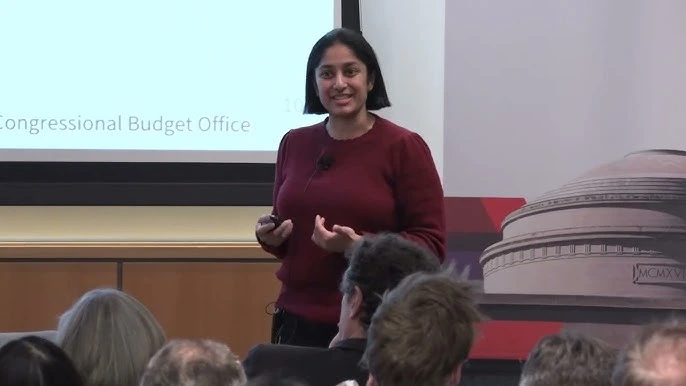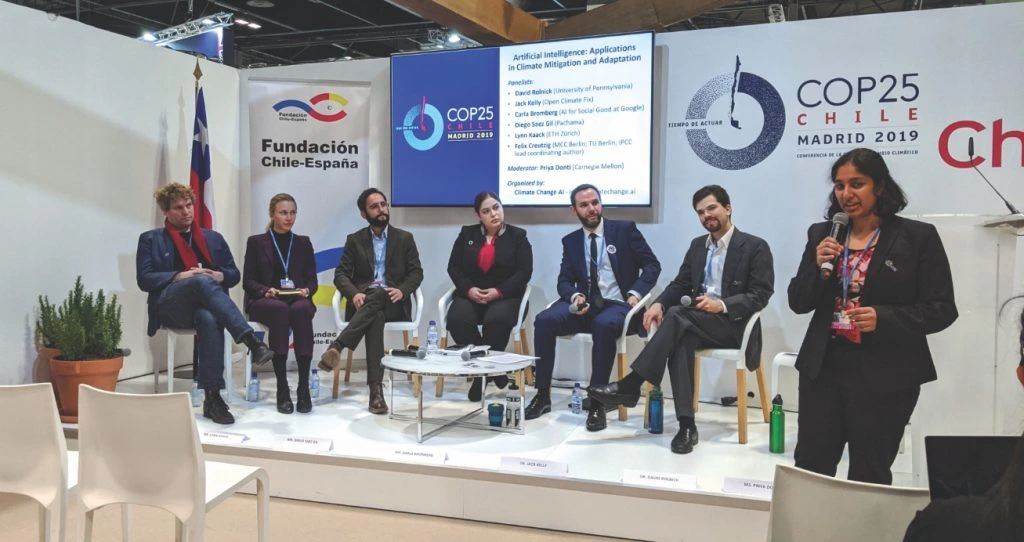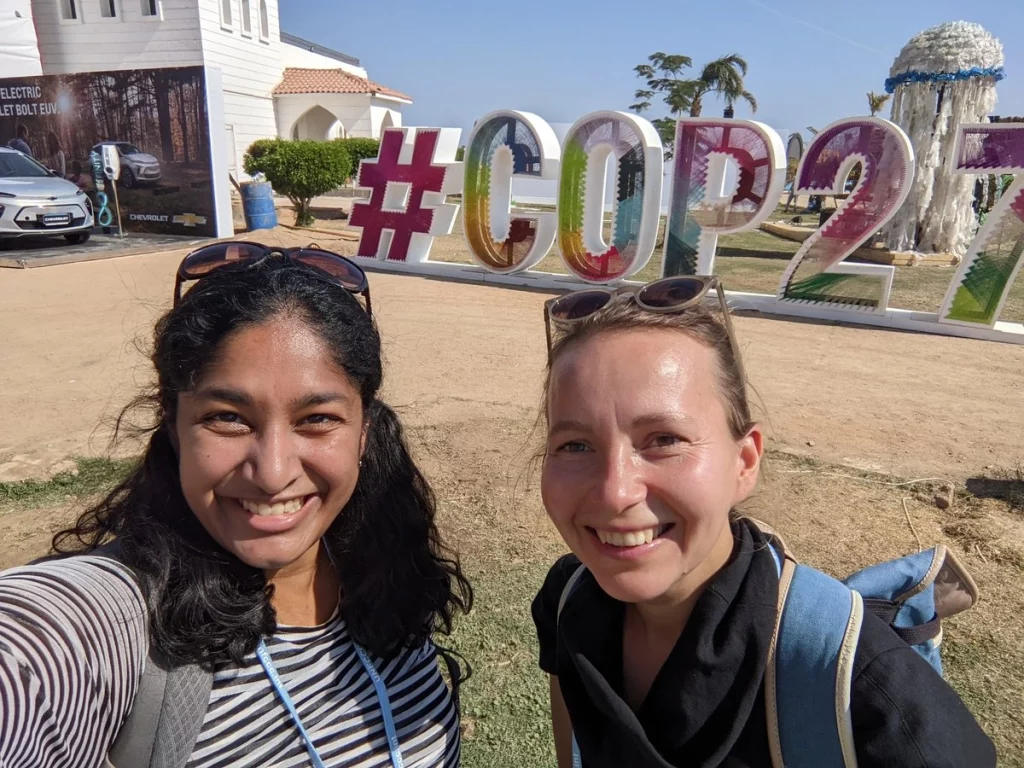(March 26, 2025) Priya Donti is an Assistant Professor at the Massachusetts Institute of Technology (MIT), where she holds the Silverman Family Career Development Professorship. The Indian-origin professor is also the co-founder of Climate Change AI (CCAI), a nonprofit that brings together the global AI community to drive responsible climate action. Since 2019, the volunteer-led initiative has connected thousands of people across academia, industry, and government through educational programs, international reports, and funding opportunities that bridge the gap between research and real-world impact.
Sometimes, a classroom experience can shape an entire future, just as it did for Priya Donti. “During my first week of high school, my biology teacher actually set aside a week or two for a student-led curriculum on sustainability,” she recalled in an interview. That early brush with environmental issues left an indelible mark, not just because climate change was an environmental problem, but because it was a deeply human one. “It has a disproportionate impact on the world’s most disadvantaged populations,” she shared, reflecting on how her upbringing as part of the Indian diaspora in the U.S. exposed her to global inequities.

Priya Donti
That early conviction led her to seek a way to connect her growing interest in computer science with her passion for climate justice. Her breakthrough came when she stumbled upon a paper titled Putting the Smarts in the Smart Grid. The paper introduced her to the immense potential of AI and machine learning in transforming energy systems. It sparked the academic path that would become her life’s work: building smarter, cleaner energy systems with the help of artificial intelligence.
Blending machine learning and renewable energy for greener tomorrow
Today, as an Assistant Professor and the Silverman Family Career Development Professor at MIT, her work sits at the forefront of machine learning and technological innovation, spanning computer, information, and energy systems. She is associated with the departments of Electrical Engineering and Computer Science (EECS) and the Laboratory for Information and Decision Systems (LIDS), an interdepartmental research center dedicated to advancing research and education in analytical information and decision sciences.
Priya Donti’s academic journey reflects a deep commitment to excellence. She earned her Ph.D. from Carnegie Mellon University and was awarded prestigious fellowships including the U.S. Department of Energy Computational Science Graduate Fellowship and the NSF Graduate Research Fellowship. Her contributions have earned accolades such as MIT Technology Review’s 2021 list of “35 Innovators Under 35” and the 2022 ACM SIGEnergy Doctoral Dissertation Award.

Priya Donti
Creating a movement through Climate Change AI
While Priya Donti’s technical research forms one pillar of her work, the other is equally impactful. She has built a global movement that connects AI with climate action. In 2019, she co-founded Climate Change AI (CCAI), a volunteer-led initiative that brings together researchers, engineers, entrepreneurs, and policymakers.
The idea took shape simultaneously among three researchers — David Rolnick at the Mila AI institute, Lynn Kaack at Carnegie Mellon, and Priya herself. “I was working at the intersection of AI and energy from a technical perspective, but sometimes felt a little bit isolated in that work,” she admitted. Together, the three researchers created a space where interdisciplinary collaboration could thrive.
Since then, CCAI has grown into a platform for global collaboration, public policy engagement, and education. It organizes community-building events, produces foundational reports such as Tackling Climate Change with Machine Learning, and helps develop networks that span continents.
Now is the time to act, and I encourage everyone to figure out how they can best leverage their unique skills and positions in society in order to tackle climate change.
Priya Donti mentioned in an interview
Climate Change AI has launched initiatives like a $2 million grants program to support researchers who are using AI in meaningful climate projects.
How AI and machine learning are powering climate solutions
Artificial intelligence (AI) refers to computer systems that can perform complex tasks typically associated with human abilities such as reasoning, vision, or speech. Machine learning, a subset of AI, focuses on analyzing large amounts of data to identify patterns and make predictions or decisions. In the fight against climate change, these technologies are proving to be powerful tools.
“There are lots of places in which additional information could help make a better decision on climate policy, or help better operate a climate-relevant system,” said Priya Donti. From using satellite imagery to detect deforestation, to forecasting crop yields or optimizing power grids, AI and machine learning are helping extract critical insights from data that would otherwise be too vast or complex to process manually.
These tools also accelerate scientific experimentation such as advancing solar panel technologies by learning from earlier test results to optimize performance or engineering low-emission building materials by drawing insights from past formulations to refine future ones.

Priya Donti speaking at a COP25 event
However, building smart technology isn’t enough. As Priya Donti explained, the real challenge is making sure these AI tools are actually used where they’re needed. For her, success goes beyond finding solutions, it’s about listening to communities, adapting to local needs, and making sure technology fits into real-world systems.
AI is not a silver bullet or magic potion
Priya Donti believes that “AI is just one tool in a broader toolkit that can be used to support or accelerate existing climate change strategies.” She sees climate change as a multifaceted issue that requires a range of approaches across multiple sectors.
“We need policymakers, people trained in the humanities, and experts in technical fields beyond computer science,” she emphasized. Her vision is rooted in systems thinking. ethical reflection and holistic approach in combating climate challenges.
While AI can speed up or support existing strategies, it must be used responsibly. For instance, training AI models can be energy-intensive, and machine learning can also be used in ways that increase greenhouse gas emissions or exacerbate societal inequities.
Her non-profit’s goal is to facilitate the impactful use of machine learning to tackle climate change by alleviating bottlenecks to doing work in this area, and by raising awareness about machine learning’s strengths, limitations, and potential side effects in the context of climate change applications.

Priya Donti at COP27
Mentors, movement-builders, and the power of community
Throughout her journey, Priya has never seen herself as working alone. “Often when it comes to the story around a particular initiative, it’s tempting to put forth a hero narrative,” she said. “But it takes a village.”
She credits her high school teacher, Mr. Furnari, for sparking her early curiosity. Mentors like Jim Boerkoel, Zico Kolter, Inês Azevedo, and Carla Gomes helped shape her academic path. And her co-founders and the broader CCAI team continue to be central to her work.
A blueprint for tech-driven climate leadership
Priya Donti’s initiatives stand as an example of how technology, ethics, and social consciousness can intersect to build a better world. She is part engineer, part organizer, and wholly committed to the cause. Whether through groundbreaking research at MIT or mobilizing a global network through Climate Change AI, she embodies a new generation of climate leaders.
Her story is a reminder that innovation doesn’t happen in a vacuum. It’s nurtured by mentors, driven by justice, and grounded in community. And it’s built on a foundation of listening, collaboration, and bold imagination.
As the world grapples with climate urgency, figures like Priya Donti offer a blueprint for how we might respond, not just with code, but with conscience.
- Follow Priya Donti on LinkedIn
- To learn more about Priya Donti and her team’s work, visit the Climate Change AI website
Also Read: AI for Good: The purpose behind University of Buffalo’s Dr Venu Govindaraju’s initiatives




